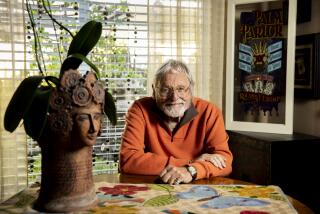Emerging Master of Metamorphosis : Art: Tom Friedman’s work is obsessively complex, converting ordinary objects into extraordinary sculptures. His mind-bending puzzles are at the Lannan Foundation.
Sweat socks, Lifesavers and trash bags are some of the unlikely materials from which Tom Friedman constructs his delicately refined sculptures and installations. He says that he likes to let his materials determine his processes. He chews bubblegum, unravels string and crumples paper. Although these sound like common actions, when Friedman does them, they are not. He is an obsessive who inexhaustibly converts ordinary objects into extraordinary sculptures.
In the Lannan Foundation’s current exhibition, “Percept/ImageObject,” Friedman, 28, is exhibited alongside such art world luminaries as Robert Irwin, Ad Reinhardt and Gerhardt Richter. The young Connecticut-based artist not only holds his own amid this prodigious company, but actually raises the stakes in a what-you-see-is-not-what-you-get game.
In this show of elegant works that artfully challenge perception, Friedman’s sculptures stand out because his materials are so goofy. His trash bag stuffed to capacity with other trash bags raises many of the same issues as other paintings, sculptures and installations in the show. Although Friedman’s objects share something in common with the spareness and simplicity of minimalism and the loftiness of conceptualism, they are furtively funny. He challenges the notion that art can lead to transcendence by grounding his objects in their commonness. They are mundane and compelling, ridiculously simple and obsessively complex.
His works are mind-bending puzzles that often require double- and triple-takes to determine what they really are and how they got to be that way. One piece looks like a paper towel casually pinned to the wall. In reality, Friedman took an ordinary sheet of typing paper and, with the same pin that holds it to the wall, pierced it thousands of times, stopping only when there was no room left for another pinhole.
“I like to let my materials define the limits of my obsession. If I had continued to poke the paper, the chances are that it would have ripped. . . . I like to think about fragility in my work. The fact that it is fragile makes you more aware of its existence. People tend to consider something more when they know it’s fragile or has been labored over,” he said on a recent visit to Los Angeles.
Despite the eccentricity of his work, Friedman in person is very low-key and boyish. He insists that his obsessive style of art-making doesn’t spill into other aspects of his life--it is a method, not his personality. He explains that “it becomes a meditative process, but it’s not necessarily relaxing or fun.” This is easy to believe when you look at his perfect circle made of eraser dust collected from what must have been myriad mistakes, a perfect cone of carefully wrapped masking tape and a geometrically exact sphere of chewed-up bubblegum.
A piece that looks like a tiny rippling tube of white marble is made of a roll of Lifesavers. Friedman sucked each piece a little longer so that it is a little smaller than the one before it. Then he glued them together with sugar and saliva (these are peppermint Lifesavers since wintergreen disintegrated in his mouth). Although there are 12 candies in a pack, there are only 11 in the piece since one broke in the making.
Friedman usually makes his works out of items associated with daily rituals and cleaning routines. He elevates materials like laundry detergent, toilet paper and toothpaste to a realm of formal rigor. These are things that we frequently use without stopping to consider their inherent formal qualities, but, in Friedman’s hands, they become strangely beautiful. Sweat socks have never looked as good as they do in his interlocked circle of socks, which resembles a Brancusi sculpture more than a bunch of footwear. Although we may use socks every day, Friedman makes us consider them anew.
Currently in the midst of a two-year teaching appointment at Wesleyan University in Middletown, Conn., where he says his works in progress will force the viewer to look even harder. “My new works have a lot to do with the amount of information with which we are presented and the ability to process it,” he says. “I’m thinking a lot about the phenomenon of experience . . . about information, categories and disinformation.”
For a piece he is working on now, he wants to write every word in the English language on a 48-inch-by-48-inch sheet of paper. He says that when it is completed it will look like a piece of cloth on the floor. Taking text-based art to its logical limit, Friedman simultaneously negates and celebrates language. “This piece is taking a long time. It’s definitely the most obsessive thing I’ve ever done. I hope I can get all the words on the paper.”
* Tom Friedman’s work can be seen in “Percept/ImageObject,” at the Lannan Foundation, 5401 McConnell Ave., (310) 306-1044 , through May 22. Hours are Tue.-Sun., 11 a.m.-5 p.m.
More to Read
The biggest entertainment stories
Get our big stories about Hollywood, film, television, music, arts, culture and more right in your inbox as soon as they publish.
You may occasionally receive promotional content from the Los Angeles Times.










